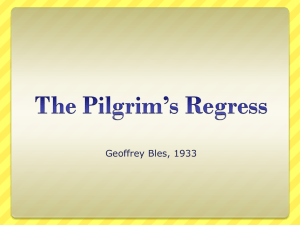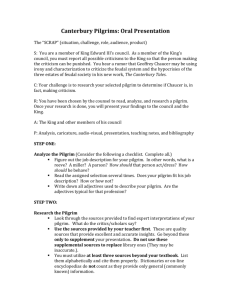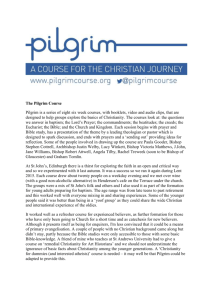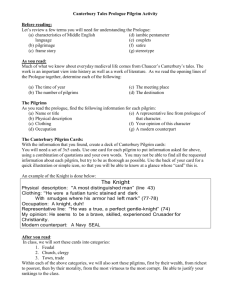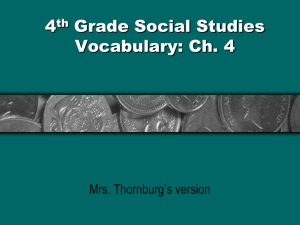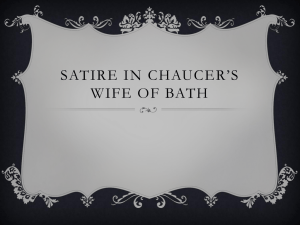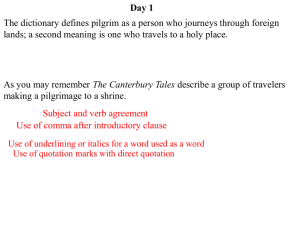Pilgrim Character Analysis Worksheet
advertisement
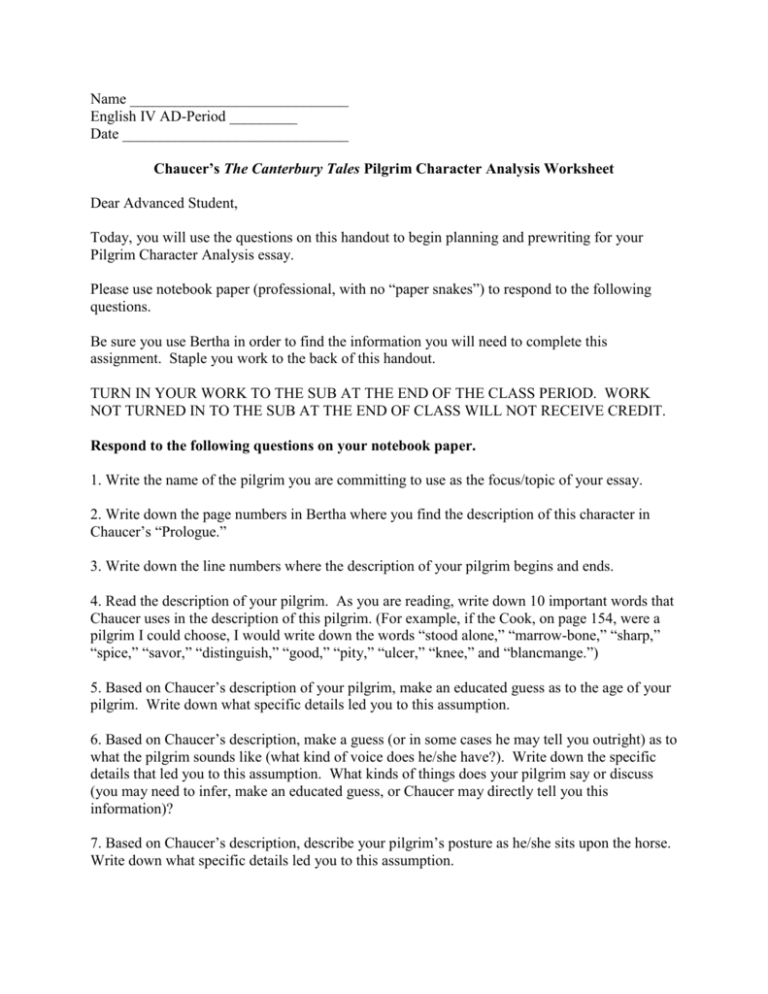
Name _____________________________ English IV AD-Period _________ Date ______________________________ Chaucer’s The Canterbury Tales Pilgrim Character Analysis Worksheet Dear Advanced Student, Today, you will use the questions on this handout to begin planning and prewriting for your Pilgrim Character Analysis essay. Please use notebook paper (professional, with no “paper snakes”) to respond to the following questions. Be sure you use Bertha in order to find the information you will need to complete this assignment. Staple you work to the back of this handout. TURN IN YOUR WORK TO THE SUB AT THE END OF THE CLASS PERIOD. WORK NOT TURNED IN TO THE SUB AT THE END OF CLASS WILL NOT RECEIVE CREDIT. Respond to the following questions on your notebook paper. 1. Write the name of the pilgrim you are committing to use as the focus/topic of your essay. 2. Write down the page numbers in Bertha where you find the description of this character in Chaucer’s “Prologue.” 3. Write down the line numbers where the description of your pilgrim begins and ends. 4. Read the description of your pilgrim. As you are reading, write down 10 important words that Chaucer uses in the description of this pilgrim. (For example, if the Cook, on page 154, were a pilgrim I could choose, I would write down the words “stood alone,” “marrow-bone,” “sharp,” “spice,” “savor,” “distinguish,” “good,” “pity,” “ulcer,” “knee,” and “blancmange.”) 5. Based on Chaucer’s description of your pilgrim, make an educated guess as to the age of your pilgrim. Write down what specific details led you to this assumption. 6. Based on Chaucer’s description, make a guess (or in some cases he may tell you outright) as to what the pilgrim sounds like (what kind of voice does he/she have?). Write down the specific details that led you to this assumption. What kinds of things does your pilgrim say or discuss (you may need to infer, make an educated guess, or Chaucer may directly tell you this information)? 7. Based on Chaucer’s description, describe your pilgrim’s posture as he/she sits upon the horse. Write down what specific details led you to this assumption. 8. Based on Chaucer’s description, describe the way this pilgrim walks. Write down what specific details led you to this assumption. 9. What distinguishing (those that stand out) marks does Chaucer mention in the description of this pilgrim? What do these features say about this character? 10. How does Chaucer describe this pilgrim physically? What key words and phrases does he use to paint the image of this character’s physiognomy (the character’s outward appearance)? Does this character have any notable expressions, gestures, or actions? What do these say about your character? 11. Shakespeare says, “…clothes make the man.” What details does Chaucer provide about what your pilgrim is wearing? What do your pilgrim’s clothes and accessories say about him/her? 12. What are some important items or images associated with your pilgrim? How are they important? 13. What is your pilgrim’s occupation? Use Bertha, your smart device, or the dictionaries at the back of the room to write the dictionary definition of your pilgrim’s profession. Do your pilgrim’s actions seem to align with his/her profession? Why or why not? 14. What interests does your pilgrim have? What does Chaucer seem to feel about this character’s interests? What ambitions does your pilgrim have? What makes him/her “tick”? 15. What beliefs (religious or otherwise) does your pilgrim have? Write down key words and phrases that support your ideas. 16. What motivates your pilgrim? Write down key words and phrases that support your ideas. 17. Based on Chaucer’s description, why is your pilgrim traveling to Canterbury? Is the purpose religious or social? What words and phrases support your thinking? 18. What clues does Chaucer give about where your pilgrim is from (in some cases, he will directly tell you)? Plan to research (especially if you do not have your smart device) a little about this place. 19. What is Chaucer’s opinion of this pilgrim? What key words and phrases support your thesis (opinion as to whether or not Chaucer likes/respects/appreciates your character)? 20. Based on the entire description, describe the pilgrim’s personality. In what ways are you like this pilgrim? In what ways are you different from this pilgrim? If you were the 31st pilgrim riding to Canterbury, would you like or dislike this pilgrim? Explain why. TURN IN YOUR WORK TO THE SUB AT THE END OF THE CLASS PERIOD. WORK NOT TURNED IN TO THE SUB AT THE END OF CLASS WILL NOT RECEIVE CREDIT.
